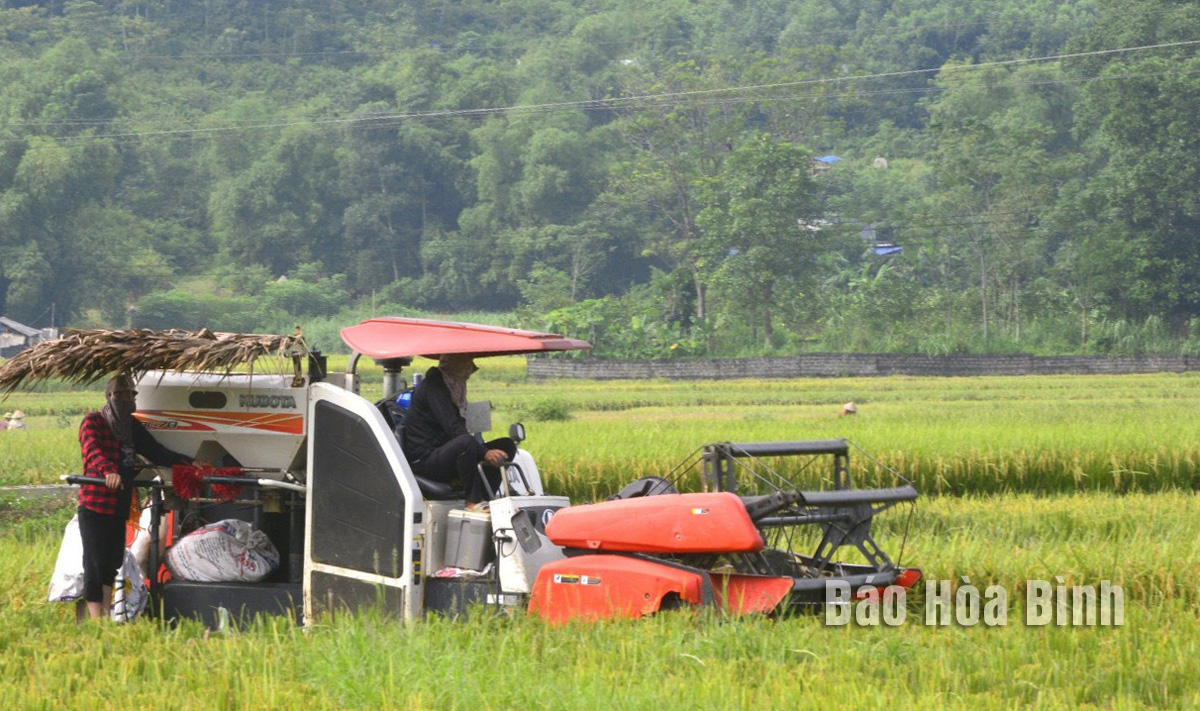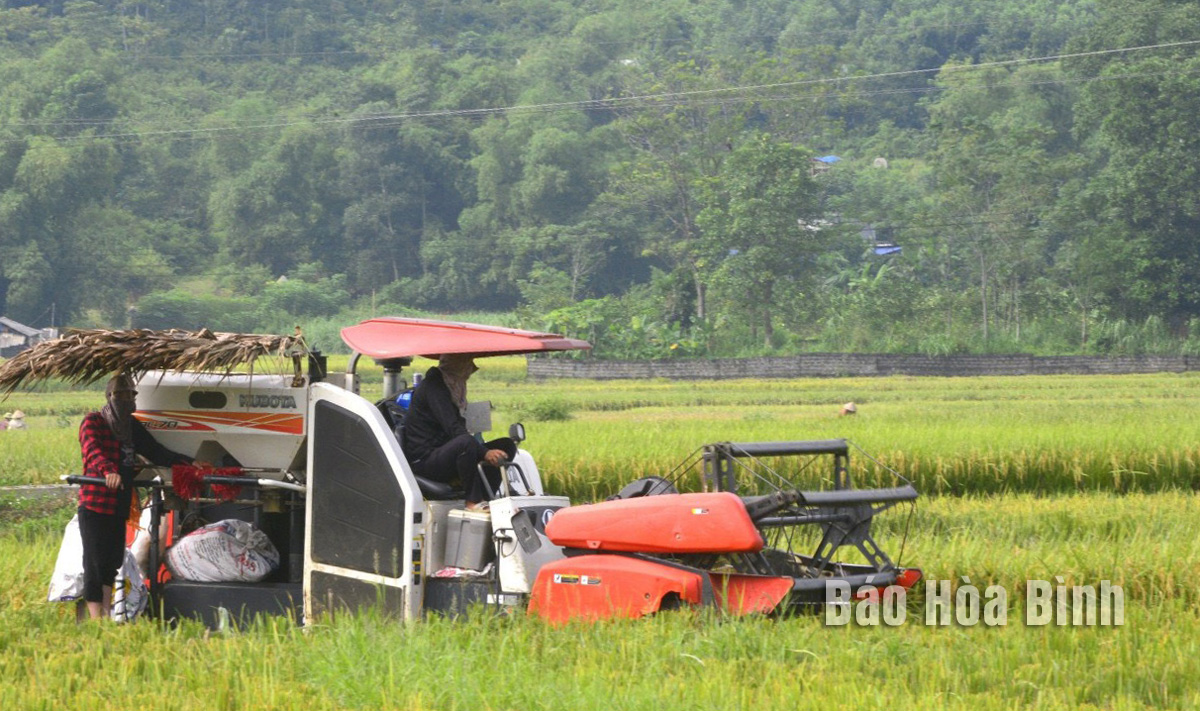
In recent years, the application of scientific and technological advances in agricultural production in Kim Boi district of Hoa Binh province has brought about positive changes. People have shifted from traditional production methods to centralised and large-scale ones, bringing plant varieties and livestock with high economic value into production, helping to improve economic efficiency in the same cultivated area and increasing local people's income.
Farmers in Bo town (Kim Boi district) use harvesters on the paddy field.
To create favourable conditions for people to access scientific and technological advances, every year, the district carries out many support activities such as organising seminars and training courses to share experience. The district’s Division of Agriculture and Rural Development is assigned to coordinate with specialised agencies and agricultural service cooperatives to provide training for local residents relating to agricultural production models that are suitable to the locality’s climate conditions, soil, and production practices. Therefore, the mechanisation ratio in land preparation and caring stages reached 99.5% and 92%, respectively, while that of the harvesting stage met 25%.
Bui Van Thien, head of Mo Khoac residential area in Bo town, said that in the past, farmers sprayed pesticides manually. Although they were equipped with protective equipment such as raincoats, gloves, and boots, they still exposed to the toxic chemicals, which might affect their health, he noted.
Upon hearing about the effectiveness of using drones to spray pesticides, he registered to use this service for the subzone’s rice cultivation area in this year's summer-autumn crop, Thien said.
He went on to say that agricultural production becomes easier with the support of machines.
According to Nguyen Thi Minh Anh, Deputy Head of Kim Boi district’s Division of Agriculture and Rural Development, along with using hybrid rice varieties and high-quality rice for cultivation, the district has synchronously applied techniques such as system of rice intensification (SRI) and integrated pest management (IPM), especially using drones to spray pesticides.
Regarding animal husbandry, thanks to the application of scientific and technological advances, many farms have reduced production costs, minimised disease infection and environmental pollution, and increased economic efficiency.
This move helps improve the competitiveness of products in the market and reduce labour and production costs. The deployment of scientific and technological advance transfer models has contributed to enhancing economic efficiency by 15 - 20% compared to traditional farming areas.
To promote the application of scientific and technological advances in agricultural production, Kim Boi district will continue to pilot new varieties in cultivation and animal husbandry in the coming time, Anh said.
Production models that apply scientific and technical advances to achieve high economic efficiency will be expanded along with models in line with Vietnamese Good Agricultural Practices (VietGAP) and organic standards to meet market requirements. The district will facilitate linkages between farmers and businesses, ensure the sale of products, generate jobs, and raise income for rural workers, she added.
According to data from the Hoa Binh Provincial Party Committee, the industrial production index for the first six months of 2025 is estimated to have increased by 20% compared to the same period last year. This marks the highest year-on-year growth rate for this period since 2020.
In the first six months of 2025, Hoa Binh province’s export turnover was estimated at 1.145 billion USD, marking an 18.11% increase compared to the same period in 2024. Import turnover was estimated at $ 804 million, a 17.15% increase, which helped the province maintain a positive trade balance.
The lives of the ethnic minority farmers in Tan Lac district have gradually improved thanks to the new directions in agricultural production. This is a testament to the collective strength fostered through the professional associations and groups implemented by various levels of the district’s Farmers’ Union.
With the motto the "product quality comes first,” after nearly one year of establishment and operation, Muong village’s Clean Food Agricultural and Commercial Cooperative, located in Cau Hamlet, Hung Son Commune (Kim Boi district), has launched reputable, high-quality agricultural products to the market that are well-received by consumers. The products such as Muong village’s pork sausage, salt-cured chicken, and salt-cured pork hocks have gradually carved out a place in the market and they are on the path to obtaining the OCOP certification.
In the past, the phrase "bumper harvest, rock-bottom prices" was a familiar refrain for Vietnamese farmers engaged in fragmented, small-scale agriculture. But today, a new spirit is emerging across rural areas of Hoa Binh province - one of collaboration, organisation, and collective economic models that provide a stable foundation for production.
Maintaining growing area codes and packing facility codes in accordance with regulations is a mandatory requirement for agricultural products to be eligible for export. Recently, the Department of Agriculture and Environment of Hoa Binh province has intensified technical supervision of designated farming areas and packing facilities to safeguard the "green passport" that enables its products to access international markets.



